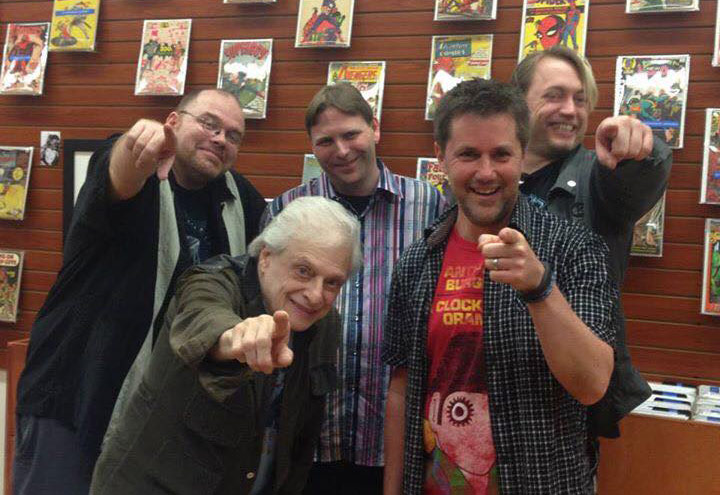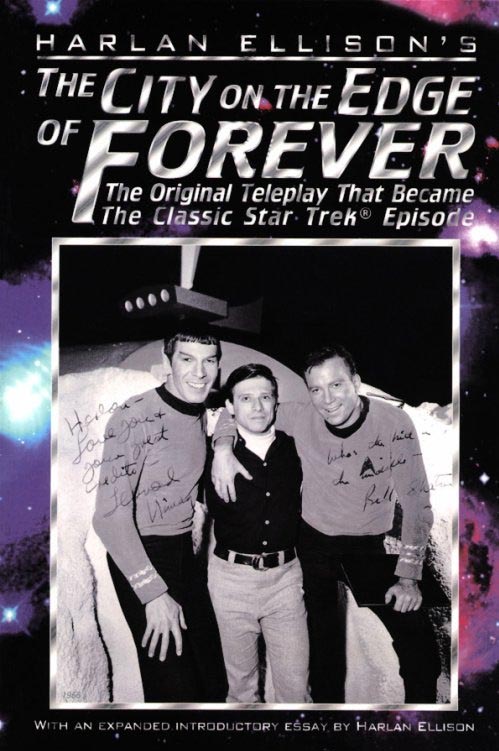I never met Harlan Ellison. I know people who met him, worked with him and even called him friend, but I never did — so where do I start talking about this titan of fiction who passed away last week?
I shouldn’t say that he was a science fiction writer — otherwise I may wake to find some gruesome spectre nailing my cat’s head to the dining room table, as he once threatened viewers of Harlan Ellison’s Watching in 1993 — despite the fact that he wrote many prolific science fiction television episodes, from the original run of The Outer Limits to Babylon 5.
He liked to consider himself a fantasist, a burr under peoples’ saddles and while he loved to be right, he also loved it when people set him straight.
But for me, of course, I can’t help but think of his contribution to Star Trek by way of “The City on the Edge of Forever,” perhaps the greatest entry in the franchise, one which hasn’t been equaled and serves as the pinnacle of pathos.
His work mattered to me, and it also mattered to some friends of mine. Devout Star Trek fans all know the controversy about the original teleplay for “The City on the Edge of Forever,” which was changed from his original story so much that he tried (and failed) to have his name removed from the television episode’s credits.
Ellison was no shrinking violet. He was abrasive and pushy, resisting anything that interfered in the promulgation of his vision. In fact, in Mark Altman’s first volume of “The Fifty Year Mission,” Ellison recounted that his vision in one of the most revered Trek episodes of all time was that this was a love story: one that transcended all other things, and one for which you would sacrifice friends, your career and even your starship for.
“The TV ending, where [Kirk] closes his eyes and lets [Keeler] get hit by the truck, is absolutely bullshit. It destroyed the core of what I tried to do. It destroyed the art; it destroyed the drama; it destroyed the extra human tragedy of it all.” — Harlan Ellison
As much as Ellison recanted the direction of the episode, it also won him both Hugo and Writers’ Guild of America awards for Best Dramatic Presentation and Best Episodic Drama on Television — regardless of how he felt about the story’s final form, it was a winner in many senses of the word and one that has resonated within the hearts of millions of viewers.
Classic Trek director Joseph Pevney, who helmed the filming of “City,” shared his own thoughts about the writer’s contribution to the series:
“Harlan was very happy to get his story on Star Trek. He was down on the set thanking me. It’s great that Gene rewrote it though, because Harlan had no sense of theatre. He had a great sense of truth, which was very nicely placed in there – all of the 1930’s stuff was well documented.
It was a well-conceived and well-written show, but in the original script’s dramatic moments, it missed badly.” — Joseph Pevney
While Ellison remained frustrated about how his Trek tale turned out — he self-published his original teleplay in 1993 in a book which included his views on the story changes made by Gene Roddenberry’s team — it wasn’t until 2014 that “City” was finally released in a form representing Ellison’s intentions.

Longtime IDW Publishing writers Scott and David Tipton partnered with artist J.K. Woodward to translate Ellison’s story into in comic miniseries Harlan Ellison’s The City on the Edge of Forever, which we of course reviewed here at TrekCore.
In the wake of Ellison’s passing, I asked J.K. to share some of his recollections on working with Ellison.
“Meeting Harlan was nerve wracking. I met him at a store signing at Blastoff Comics in N. Hollywood. Scott Tipton owns the store and [former IDW editor-in-chief] Chris Ryall arranged the meeting. I spent most of the signing in the back room drinking liquid courage from an old star trek flask I had.
Working with Harlan was thrilling! I understood what he wanted and loved his vision. With him I created my best work to date and it couldn’t have been a better experience!
Knowing Harlan was the best! Unlike anyone else in my life, the work mattered to him. His priority was all things imaginative. He would bring up the projects, where as everyone else in my life would politely change the subject when I talked such things as friends, family, and co-workers, while well-meaning, simply didn’t understand that everything else seemed trivial in comparison to creative endeavors, but Harlan understood that well. ‘tis I, the beloved Helena.
After hearing about his passing, the world seems like a lonelier place. Even if I didn’t call him up every time I wanted to talk, I would lean on the idea of Harlan for strength. When it seemed like no one wanted to hear it, I’d simply think, ‘Well I know Harlan would have an opinion on this.’ It made me feel a little less isolated in the work I do.” — J.K. Woodward
Scott Tipton shared his own feelings on Ellison’s passing:
“Of all the unexpected pleasures life has shown me, being able to say this may have been the sweetest: Harlan Ellison was my friend. The world will forever be a poorer place without him.” — Scott Tipton
However, I am particularly drawn to Ellison’s own axioms in which he declared: “We live to say ’No!’ to death.”
Part of the human existence in all its forms is, as Ellison might put it, bullshit. To say ‘No!’ to death is to live all of that wonderful, frustrating, exhilarating, crushing, tender and abrasive-as-hell experience; it’s an affirmation of all of the qualities that we experience in this short yet repetitive shuttle around the sun.

Ellison taught me that and while I am a guy who cannot handle roller-coasters, I have learned that one needs to be on them to feel alive. “The City on the Edge of Forever” taught me the sacrifice of love, even if Ellison didn’t want that. In a sense, the original script was a sacrifice to his own love of writing. While not the final version, it still earned Ellison accolades and status from science fiction and Star Trek fans alike.
The shared comic project was a not only a testament to the vision of Ellison’s approach to life, but a vindication of it. It was clear that the television version, despite its success, was a burr in his own saddle. Despite its acclaim, its awards and the fact that it had millions of adoring fans, it was clearly something that needed to be revisited.
Ryall, the Tiptons, and Woodward gave him that renewed voice that emerged from the blanket of decades. Through them and others, I learned more of his raconteur-ishness, his utter disdain for anyone’s opinion — unless the theoretical equivalent of a steel-studded mace smashed through his wall of biases and preconceptions — his coded vault of comics, and his pathological hatred of hugs.

Ellison claimed that the good science fiction that was to give Star Trek its distinctive appeal was because of him.
“I said, ‘This is our chance to get good science fiction on the tube. It’s being run by people who seem to know what they’re doing and they want us.’ That was how Roddenberry came to hire Ted Sturgeon and the others, because of my intercession.
Everybody else takes credit for it, but all of these people were friends of mine, and I got them to go in on the show.” — Harlan Ellison
I never met Harlan Ellison, and I never will now. But his writing survives and it is remembered for me by another generation of storytellers, who, in a sense can now trace their own lineage back to this surly fantasist.
He was here, and the universe is just a little short of infinite without him.
